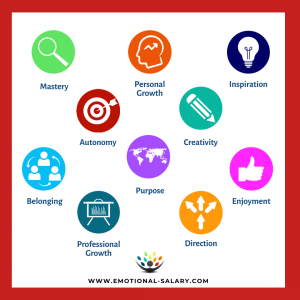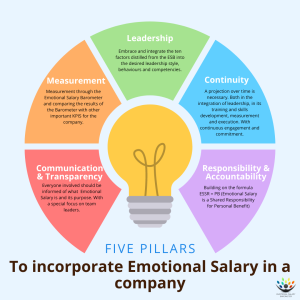Context and Origins
The Emotional Salary Barometer was born out of a personal concern to know, explore and validate something I had seen and experienced in my work in large and strong companies and organisations, namely that when people give their best or worst at work, the reasons go far beyond the financial or flexible rewards they receive at work.
The words we hear in companies are always the same: motivation, engagement, culture… words we all know and use and which are widely used in companies. But what was the driving force behind this motivation, commitment or culture? What were the factors that made up this driving force?
 So I decided to get down to work and invest all my resources in finding out, a critical issue for me when we talk about work and the impact it has on us, on our performance at work and on the various systems in which we operate (family, friends, society), and from this research and work emerged the Emotional Salary Barometer, which measures how ten fundamental factors (Autonomy, Belonging, Creativity, Direction, Enjoyment, Mastery, Inspiration, Personal Growth, Professional Growth and Purpose) manifest themselves individually and in teams in organisations.
So I decided to get down to work and invest all my resources in finding out, a critical issue for me when we talk about work and the impact it has on us, on our performance at work and on the various systems in which we operate (family, friends, society), and from this research and work emerged the Emotional Salary Barometer, which measures how ten fundamental factors (Autonomy, Belonging, Creativity, Direction, Enjoyment, Mastery, Inspiration, Personal Growth, Professional Growth and Purpose) manifest themselves individually and in teams in organisations.
A common challenge
Since our launch, not a single person has questioned the importance of this issue in the workplace.
After all, the figures on many workplace-related realities are truly worrying:
- In Spain, a third of cases of depression in the working population are due to the conditions of our jobs and our relationships at work.
- One in four workers regularly takes anti-anxiety drugs and sleeping pills. The side effects associated with these medications are significant.
- Investing in the care and well-being of people at work has a positive impact on employees, but also on companies. A study by Deloitte in the UK shows that for every £1 invested in resources to improve mental health in the workplace, companies gain £5 in reduced absenteeism.
- Mental health has become the number one reason for leaving a job.
However, one of the key challenges for leaders in organisations is to communicate the impact of an issue that at first glance appears to be a ‘nice to have’ or something intangible and difficult to quantify, measure and monitor, on something that impacts the bottom line. In other words, what impact will an investment in Emotional Salary have on my business results? These are valid questions because every workplace is, or should be, a human community that has come together with the intention of satisfying a need, creating and developing a service or product to do so, and generating benefits that allow it to grow and be sustained over time. So any investment needs to be carefully and continuously evaluated, putting people at the heart of the initiative.
The case study
Almost three years ago, we received a call from the People Development Manager of the retail sales team of an international luxury cosmetics company who was interested in integrating the concept of Emotional Salary into their leadership and people development strategy.
The context was that not only were we all experiencing difficult times due to the global pandemic situation, but there was also a lot of dissatisfaction in the workforce for internal reasons. For legal and business reasons, certain aspects of people’s employment contracts had to be changed, and this had caused a lot of dissatisfaction and uncertainty among staff.
The five pillars
We therefore created a strategic plan to integrate the Emotional Salary with five main pillars:

- Communication and transparency: Everyone involved had to be informed about what the Emotional Salary was and its purpose, to create awareness and avoid misinterpretations or fears. A special focus on team leaders as the cornerstone of the process.
- Measurement: We wanted to do the measurement using the Emotional Salary Barometer by comparing the results of the Barometer with other important KPIS for the company.
- Leadership: We would adopt and integrate the ten factors from our research into leadership style, desired behaviours and desired competencies.
- Continuity: The process needed to have a projection of at least 3 years. In other words, we needed to have a long-term vision in terms of leadership integration, training, measurement and implementation, with the ongoing involvement of team leaders, employees and those responsible for strategy and people development.
- Responsibility & Accountability: We put a special focus on the issue of shared responsibility and accountability. Based on the formula ESSR = SB (Emotional Salary is a Shared Responsibility for Self Benefit), where we focus on the fact that one of the main keys to the success of the process is the shared responsibility for the Emotional Salary for myself and others, and that this will have a benefit for me, my wellbeing and my growth.
The result
To date, the company reports the following results
- Reduced turnover costs
- Encouraging a new style of leadership that promotes each person’s responsibility for their wellbeing, emotional needs, personal and professional development (Personal/Professional Growth).
- Increased empathy among team members and between team leaders and team members (Belonging).
- Improvement in commercial results of up to 12% in some stores.
Aspects that contributed and supported the improvement in commercial results are:
- Improved communication between teams and internally within teams (Creativity, Belonging).
- Improved working environment (Enjoyment)
- Improved overall resilience to sales challenges (Professional Growth)
- Reduced internal conflict within teams (Personal Growth).
Conclusion
Let’s not forget that human beings have to satisfy several domains, including the work domain. This means that in the workplace, as in any human community, the person (the employee) must find a space that facilitates and promotes his or her integral development as a person in different dimensions. This is what we are doing by integrating the Emotional Salary into organisations. We need to start preparing for an uncertain future by using all the intellectual, social and emotional capital we have in our workplaces. Let’s start now. What do you need from us? Contact us here